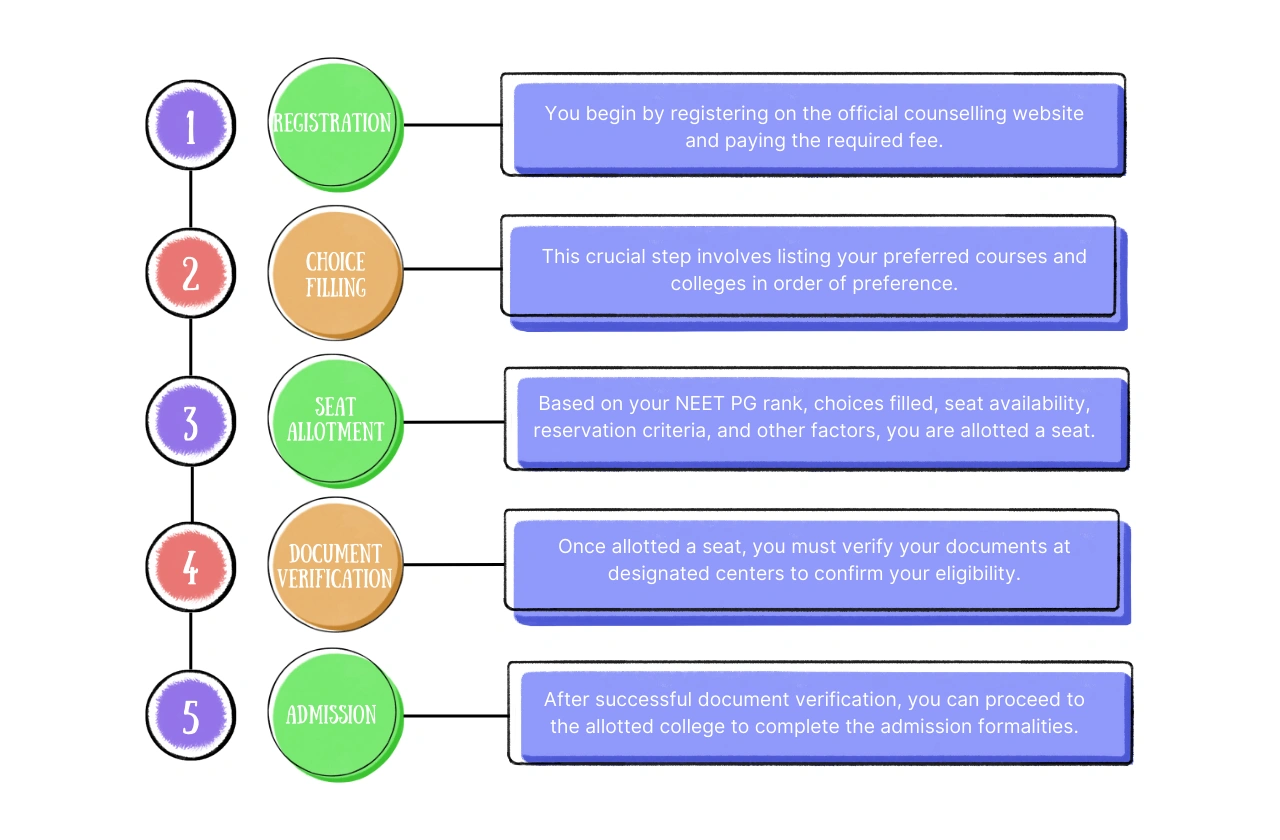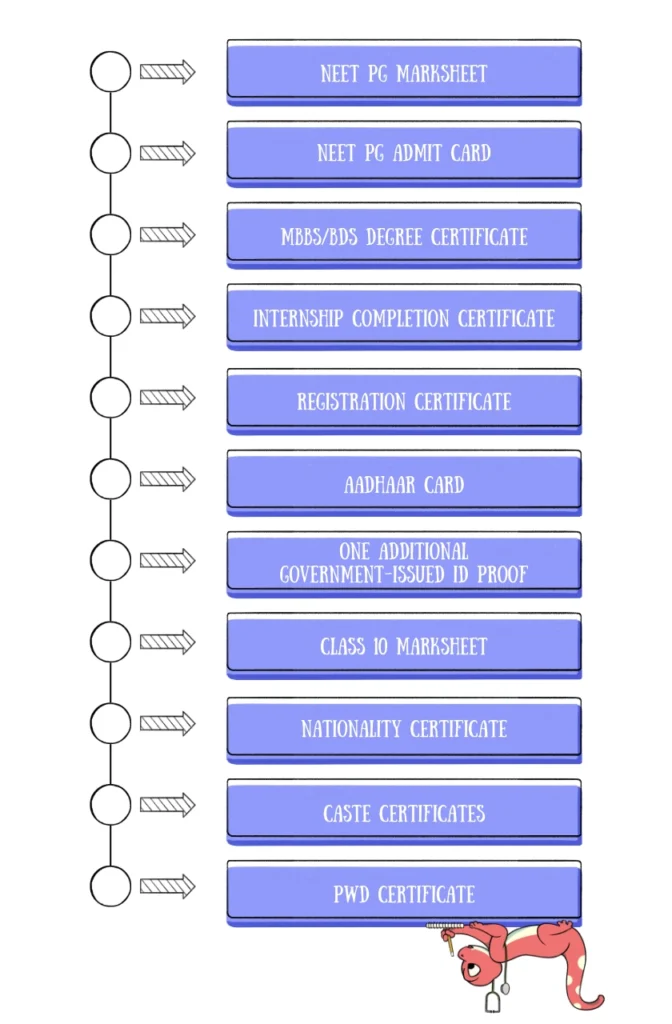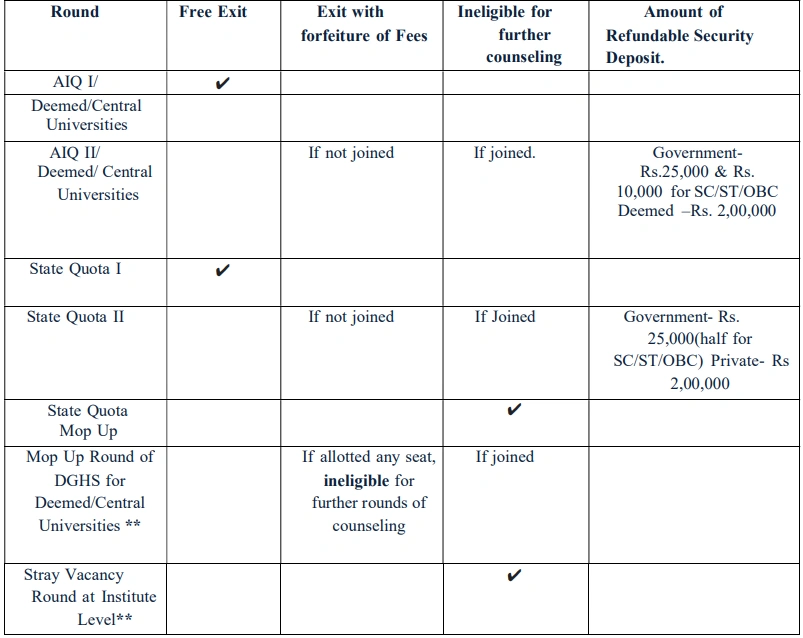Navigating the path to a postgraduate medical degree in India can feel like traversing a complex maze. The National Eligibility cum Entrance Test for Postgraduate courses (NEET PG) is a crucial step, but it’s only the beginning.
After clearing this significant hurdle, aspiring doctors face the equally important NEET PG counselling process. This process, which determines your admission to desired medical institutions, can often seem daunting and intricate.
This comprehensive guide aims to demystify NEET PG counselling for you. We’ll break down the process into easily digestible parts, providing a clear roadmap to help you secure your dream postgraduate seat.
From understanding the essentials of counselling and gathering the necessary documents to mastering the intricacies of choice filling and navigating the different rounds, this article will equip you with the knowledge and confidence to succeed.
What is NEET PG Counselling?
NEET PG counselling is the centralized process through which eligible candidates are allotted seats in various postgraduate medical courses (MD/MS/Diploma/DNB) across India.
It’s a systematic procedure that follows the declaration of NEET PG results. Your performance in the NEET PG exam, reflected in your All India Rank (AIR), plays a pivotal role in this process.
The counselling process involves several key steps:

The counselling process is conducted in multiple rounds to ensure maximum seat allocation and provide candidates with opportunities to upgrade their choices.
You need to have the right documents for NEET PG counselling. The next section will tell you about these documents.
Documents Required for NEET PG Counselling
Proper documentation is the bedrock of a smooth and successful NEET PG counselling process.
It’s essential to gather and organize all required documents meticulously to avoid any hiccups during verification. Here’s a comprehensive checklist:

NEET PG 2024 Examination Records
- NEET PG Marksheet: This document provides official confirmation of your score in the NEET PG examination.
- NEET PG Admit Card: Serves as proof of your participation in the NEET PG exam.
Academic Qualifications and Medical Registration
- MBBS/BDS Degree Certificate: Your primary medical degree certificate.
- Internship Completion Certificate: Verifies the successful completion of your mandatory internship.
- Registration Certificate: Issued by the National Medical Commission (NMC) or State Medical Council, validating your medical registration.
Personal Identification and Verification
- Aadhaar Card: Serves as primary proof of identity.
- One Additional Government-issued ID Proof: This could be your PAN Card, Passport, Voter ID, or Driving License.
- Class 10 Marksheet: Used as proof of birth date.
- Nationality Certificate: Required for candidates whose nationality is in question.
Reservation and Special Category Certificates (If Applicable)
- Caste Certificates: For SC/ST/OBC candidates, valid caste certificates are required to avail of reservation benefits.
- PwD Certificate: Candidates with disabilities must provide a valid PwD certificate.
You now know about the required documents. The next section gives you tips for document verification.
Tips for NEET PG Document Verification
Document verification is a critical step in the NEET PG counselling process. Meticulous preparation and attention to detail can ensure a smooth and hassle-free experience.
Here are some valuable tips to keep in mind:
1) Organize Your Documents:
- Create a checklist of required documents: Prepare a comprehensive checklist of all the documents mentioned above. This checklist will serve as a handy reference and help you stay organized throughout the process.
- Arrange documents in chronological order: Arrange your documents in a logical order, such as chronologically or by category. This will make it easier for the verification officer to review your documents efficiently.
- Keep photocopies ready: Create multiple photocopies of all your documents. Keep the original documents and their photocopies in separate folders or files to maintain clarity and avoid confusion.
2) Verify Document Authenticity:
- Ensure all documents are original and attested: Submit only original documents during verification. If any document requires attestation, ensure it is done by a gazetted officer or the competent authority specified in the counselling guidelines.
- Cross-check for errors and discrepancies: Before heading for document verification, carefully review all your documents. Check for any errors in personal information, spellings, dates, or any discrepancies that might cause issues during verification.
3) Stay Updated:
- Check the official website for any updates or changes in the document requirements: The specific document requirements or guidelines might vary slightly from year to year. Stay updated by regularly checking the official MCC website and any notifications or announcements related to document verification.
Keep these tips in mind for a smooth process. Next, learn about the counselling process and important dates.
Understanding the NEET PG Counselling Process and Important Dates
The NEET PG counselling process is conducted in different rounds to provide candidates with multiple opportunities to secure a seat and potentially upgrade their choices.
Familiarizing yourself with the counselling schedule and the distinction between state and national level allotments is essential.
Counselling Schedule:
The Medical Counselling Committee (MCC) announces the detailed counselling schedule on its official website. The schedule outlines the specific dates for each round of counselling, including:
Round 1 Dates: The first round of counselling is generally the largest and offers the maximum number of seats across various courses and colleges.
- Registration began on September 20, 2024, and concluded on November 17, 2024.
- Choice filling was open from November 8 to November 17, 2024.
- Seat allotment results were announced on November 20, 2024.
Round 2 Dates: The second round is conducted to fill the vacant seats remaining after the first round.
Candidates who didn’t get a seat in the first round or those who wish to upgrade their allotment can participate in the second round.
- Registration starts on December 4, 2024.
- Choice filling will occur from December 4 to December 12, 2024.
- Results will be declared on December 20, 2024.
Mop-up Round Dates (if applicable): The MCC may conduct a mop-up round to fill any remaining vacancies after the completion of the first two rounds.
This round aims to ensure maximum utilization of available seats. The dates for the mop-up round, if conducted, will be announced after Round 2.
It’s crucial to stay vigilant and regularly check the MCC website for any updates or changes in the counselling schedule. Missing deadlines can lead to forfeiture of your chance to participate in a particular round.
State vs. National Allotments:
NEET PG counselling is conducted at two levels: All India Quota (AIQ) counselling, which is conducted by the MCC, and state-level counselling, conducted by respective state authorities.
- All India Quota (AIQ) Counselling: This counselling is for 15% of the total seats in government medical colleges across India (except Jammu & Kashmir). Additionally, it covers all seats in central universities, deemed universities, ESIC, and AFMS institutions. Any Indian national, regardless of their state of residence, is eligible to participate in AIQ counselling.
- State-Level Counselling: The remaining 85% of seats in government medical colleges are filled through state-level counselling. Each state conducts its own counselling process for these seats, and eligibility criteria may vary. Generally, candidates need to fulfill domicile requirements of the respective state to participate.
Understanding the distinction between AIQ and state counselling and their respective eligibility criteria is vital for making informed choices and maximizing your chances of securing a seat.
Choice Filling:
Choice filling is arguably the most crucial step in the NEET PG counselling process. It’s where you exercise your preferences and prioritize your desired courses and colleges.
A strategic and well-thought-out approach to choice filling can significantly influence your chances of getting your preferred allotment.
Here are some key aspects to keep in mind during choice filling:
- Comprehensive Research: Before you start filling your choices, conduct thorough research on the available courses, colleges, their faculty, infrastructure, and reputation. Consider factors like location, specialization, future career prospects, and personal preferences.
- Prioritize Wisely: List your preferred courses and colleges in descending order of preference. Start with your most desired option and gradually move down to your less preferred ones.
- Be Realistic: While aiming for the top choices is natural, it’s important to be realistic and consider your NEET PG rank and the competition. Include a mix of ambitious and safe choices to increase your chances of securing an allotment.
- Fill Ample Choices: Don’t hesitate to fill in a substantial number of choices. The more choices you fill, the higher your chances of getting an allotment, even if it’s not your top preference.
- Don’t Overlook Peripheral Factors: Consider factors like location, cost of living, and proximity to family and support systems. These factors can significantly impact your overall experience during your postgraduate studies.
- Review and Recheck: Before finalizing your choices, carefully review and recheck your list. Ensure there are no errors in the order of preference or any omissions of desired options.
Remember, choice filling is a strategic exercise. Take your time, analyze your options carefully, and make informed decisions that align with your career aspirations and personal preferences.
For example, you might list harder-to-get colleges first and easier choices next, so you might get lucky and be accepted into one of your top choices. Alternatively, you might list your choices in the order of your preference, so that you are guaranteed to get into at least one college.
You should know how seat allotment works. The next section will explain this.
Understanding NEET PG Counselling Seat Allotment
After the choice-filling window closes, the seat allotment process begins. The seat allotment is carried out by the counselling authorities based on a complex algorithm that considers several factors:
- NEET PG Rank: Your All India Rank (AIR) is a primary determinant in seat allotment. Candidates with higher ranks have a better chance of securing their top choices.
- Choices Filled: The order of your filled choices plays a crucial role. The algorithm tries to allot you the highest possible choice based on your rank and availability.
- Seat Availability: The number of seats available in each course and college influences the allotment process. High-demand courses and colleges tend to have higher competition.
- Reservation Criteria: Reservation policies for different categories (SC/ST/OBC/EWS/PwD) are applied during seat allotment.
- Other Factors: Other factors, such as tie-breaking rules in case of candidates with the same rank, may also be considered.
Once the seat allotment process is completed, the results are published on the official counselling website.
You can log in to your account to check your allotment status. If you are allotted a seat, you’ll need to proceed with document verification and admission formalities.
Cancellation of Allotment
While it’s natural to strive for the best possible allotment, there might be situations where you need to cancel your allotted seat.
It’s essential to understand the rules and consequences associated with cancelling an allotment.
Cancellation Fees: Most counselling authorities levy a cancellation fee if you choose to cancel your allotted seat. The fee amount may vary depending on the round of counselling and the specific rules of the counselling body.
Round 1:
- Free Exit: Candidates allotted a seat in Round 1 can choose not to join the college without penalty. This “free exit” allows candidates to participate in subsequent rounds without losing their security deposit. A full refund will be issued after the counselling process concludes, which may take several months (typically 6-10 months).
- Security Deposit Refund: The refund amount depends on the seat type:
- All India Quota (AIQ) Seats: ₹25,000 for General candidates and ₹10,000 for SC/ST/OBC candidates.
- Deemed Universities: ₹2,00,000 for all categories.
Round 2 and Onwards:
- No “Accepting” a Seat: In Round 2 and subsequent rounds, candidates apply for seats by filling in their choices of colleges in order of preference. Seats are allotted based on merit and availability.
- Exit with Penalty: If a candidate is allotted a seat in Round 2 or later and does not join the college, their security deposit will be forfeited.
- Cancellation Fees: Penalties for cancelling after being allotted a seat vary based on the timing:
- Before the Last Date of Joining (Round 2):
- Degree Seats: ₹1.5 lakh
- Diploma Seats: ₹60,000
- After the Last Date of Joining (Round 2) but Before Mop-up Round: Penalty increases to ₹7 lakh. After Mop-up Round: Penalties can go up to ₹18 lakh depending on the course.
- Before the Last Date of Joining (Round 2):
Stray Round:
Candidates who fail to join after being allotted a seat in the stray round may face forfeiture of their security deposit and could be debarred from participating in NEET PG exams for the following year.
Important Notes:
- The free exit option is only available in Round 1.
- All cancellations after being allotted a seat in Round 2 or later will incur significant penalties.
- The security deposit refund process can take several months.
Consequences of Cancelling in Different Rounds: Cancelling your seat in the initial rounds might have less stringent consequences compared to cancelling in later rounds or the mop-up round. In some cases, cancelling in later rounds might make you ineligible for subsequent rounds or future counselling sessions.
Rules and Regulations: The specific rules and regulations regarding cancellation, including deadlines, refund policies, and any penalties, are detailed in the counselling brochure or information bulletin.

Before deciding to cancel your allotment, carefully review the cancellation policy and weigh the consequences against your reasons for cancellation.
Common Issues and Solutions
The NEET PG counselling process, while structured, can sometimes present challenges.
Here are some common issues candidates might encounter and potential solutions:
- Technical Glitches: The online counselling platform might experience technical glitches or errors. If you face any technical issues, contact the MCC helpline or support team immediately. Keep screenshots of any error messages as evidence.
- Document Discrepancies: Ensure your documents are accurate and error-free. Even minor discrepancies can lead to delays or rejection. If you identify any errors, rectify them with the issuing authority well in advance of document verification.
- Misinterpretation of Rules: The counselling process has specific rules and regulations. Misinterpreting these rules can lead to missed deadlines or incorrect choices. Read the information bulletin carefully and seek clarification from official sources if needed.
- Lack of Awareness: Staying updated with the latest information and announcements is crucial. Missing important updates can have adverse consequences. Regularly check the MCC website and your registered email for notifications.
Proactive planning, meticulous attention to detail, and seeking timely assistance can help you navigate these challenges effectively.
Conclusion
NEET PG counselling marks the culmination of your hard work and dedication in pursuing a postgraduate medical degree.
By understanding the nuances of the counselling process, preparing your documents meticulously, and making informed choices, you can significantly increase your chances of securing a seat in your desired course and college.
Remember, patience, persistence, and a strategic approach are your allies in this journey. Equip yourself with the knowledge and confidence to navigate the counselling maze successfully and embark on the next chapter of your medical career.
NEET PG Counselling FAQs
1) What documents are required for NEET PG counselling registration?
During the online registration process, you’ll primarily need your NEET PG details (roll number, rank, etc.) and personal information. You’ll also need to pay the required counselling fee.
2) Which certificate is required for NEET PG counselling?
While “certificate” can be broad, key certificates include:
- NEET PG Admit Card.
- NEET PG Result/Rank Letter.
- MBBS Degree Certificate/Provisional Certificate.
- Internship Completion Certificate.
- Permanent/provisional registration certificate issued by MCI/ SMC. (among others)
3) Which documents are required for NEET counselling?
For NEET PG counselling, the documents generally include:
- NEET PG Admit Card.
- NEET PG Result/Rank Letter.
- MBBS Mark Sheets.
- MBBS Degree Certificate/Provisional Certificate.
- Internship Completion Certificate.
- Proof of Date of Birth (Class 10th certificate/Birth Certificate).
- Valid ID Proof (Aadhar Card, PAN Card, etc.).
- Caste Certificate (if applicable).
- Disability Certificate (if applicable).
4) Which document is needed for PG admission?
For PG admission, you’ll need a comprehensive set of documents, including those listed above, and potentially additional documents like:
- Allotment Letter issued by MCC.
- Migration certificate.
- Character certificates.
- Any other documents requested by the alloted college.

